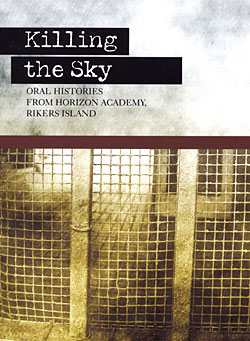Killing The Sky
"My father stayed with his legal job and took care of his family. That's why I respected him. But what when it comes down to respecting people on some gangstas, I had all the bad role models, people who been locked up, people who got shot, people who shot people, that's who I respect."
Those words, written by Saint, a young member of the Crips gang, typify the clear-eyed but fatalistic worldview found in "Killing the Sky: Oral Histories from Horizon Academy, Rikers Island." Published in a limited edition in early May by TC's Student Press Initiative (SPI), Killing the Sky "provided six incarcerated young men the opportunity to share the insights and wisdom of their lived experiences in printed form," says Erick Gordon, SPI director and curriculum consultant. "It extends their sphere of influence by giving them an audience beyond their confined and restricted existence."
With the support and assistance of the New York City Department of Corrections and the Department of Education, Gordon and other SPI consultants recorded a number of audiotaped interviews with the men over a series of months. In addition to speaking freely about their own lives, the men also discussed oral history as a literary tradition, read profiles from various publications, and worked with SPI to edit and shape the transcripts of their own histories.
"They talked about common male adolescent topics such as family, women, dreams, drugs, fights, schools and gangs. Pride emerges as a dominant theme; earning and getting respect may be read as the critical dynamic for their survival-in and out of jail," says David Iasevoli, a teacher at Rikers Horizon Academy, an alternative public high school spread over five facilities on Rikers Island, the largest jail (temporary holding facility) in the United States.
The Rikers Island project represents new ground for SPI, which typically works with classes of middle and high school students in more traditional classroom settings. "We are deeply committed to supporting teachers in creating publication venues-books, recorded performances, and digital media-through which all students have opportunities to demonstrate and share their learning with and for others. SPI offers teachers the curricular support necessary to design imaginative and expansive ways to engage students in writing projects that will not only support their growth as competent and skilled writers but also position them to act on their knowledge by sharing it with others," says Professor Ruth Vinz, who sponsors SPI through the Morse Center for the Professional Education of Teachers at Teachers College. SPI has produced 16 publications since its inception two years ago and has worked with students and teachers in widely varying grade levels, subjects and school systems. Titles have included, Linking Literature: Using Oral History to Connect Books to the World, About Face: Portraits of Activism, and Temporary Identity: How to Survive High School and Other Student Insights. The focus, Gordon said, is to motivate students through audience-centered creating. "I can think of no greater motivator than the idea of taking writing public.
I've seen students perform in ways unexpected to them or me. In the Killing The Sky project, for example, participants said again and again that they'd never engaged in a school project where they felt so successful." The SPI model is designed to support curriculum-based publication projects. According to Gordon, "we all know that there are ample opportunities for self-selected student writers to seek publication. SPI aims to democratize that process by offering every student not just the opportunity to publish, but requiring that each and every student produce work worthy of publication. We set the bar high and do everything it takes to support students' success in meeting the demands of taking their work public."
The book was the focus of a reading on May 4 at Rikers. Only one of the stories' authors was able to participate: two had been moved to solitary confinement, two had been re-sentenced to another facility, and Saint, the young man quoted above, was murdered in his old neighborhood just days after his release from Rikers. The book is dedicated to his memory.
"The Rikers Project is only a start," says Vinz. "If we are serious about not leaving our children, or adolescents, behind, we need to help young people see how their learning can help them construct, negotiate, understand and take constructive action in the world."
An important goal of SPI is to foster professional development for teachers. SPI is adding a curriculum guide series to its collection. Titled Project Notes, the first of this series will be released in early July. "The notes will be an innovative curriculum guide series aimed at helping teachers learn from the work other teachers have done to bring publication to their classrooms," Gordon says.
Copies of Killing the Sky and other SPI publications are available at the TC bookstore.
Published Tuesday, Jun. 21, 2005
